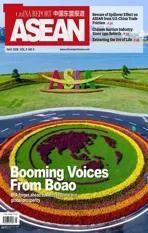FUELING INDONESIA’S CREDIT RATING UPGRADE
2018-06-07ByTianYuan
By Tian Yuan

Two Indonesian women take a photo with a bullet train model at the groundbreaking ceremony of a high-speed rail project in West Java, Indonesia,on January 21.
On April 13, Moody’s Investors Service upgraded Indonesia’s sovereign credit rating to Baa2,changing the country’s outlook to “stable” from “positive.” This was the highest rating that the Southeast Asian nation has ever received from Moody’s. All major global rating agencies including Moody’s and Fitch Ratings have now upgraded Indonesia’s sovereign credit rating after the 2008 global financial crisis.
“Positive” to “Stable”
Moody’s believes that Indonesia’s credible and healthy fiscal and monetary policies demonstrate macroeconomic stability and enhance investors’con fidence in the country’s ability to address economic turmoil. Statistics provided by Moody’s show that the Indonesian government has strictly implemented policy to keep its fiscal deficit at less than 3 percent of its GDP, and at the same time the central bank of Indonesia carried out effective measures at both central and local levels to keep a low and stable in flation rate for three straight years. In addition,the central bank has adequate foreign exchange reserves,so it can ensure flexibility in exchange rate intervention while maintaining overall stability of the Indonesian rupiah.
Agus Martowardojo, governor of Indonesia’s central bank, noted that amid mounting uncertainty in the global economy and a gloomy outlook for the regional economy, the international investment community’s recent recognition of Indonesia’s economic performance is very meaningful, which testifies to the results of the Indonesian policymakers’ efforts to maintain macroeconomic stability. Market analysts widely believe that the upgrade places Indonesia’s sovereign credit rating on par with the Philippines and India,which is not only conducive to the implementation of largescale infrastructurefinancing plans proposed by Indonesian President Joko Widodo, but also enhances the country’s capacity to resist external risk and maintain a dynamic economic recovery.
Moody’s noted that the“stable” outlook takes into account political risks that may exert negative impacts on the implementation of economic policies and the progress of economic reforms, especially ahead of next year’s elections in Indonesia.
The Jakarta Post commented that Indonesia’s potential economic growth rate is expected to hit 7 percent, a goal that President Widodo promised to reach before the end of his term in October 2019.However, the country’s growth rate has remained at about 5 percent since 2014, with a slight decline compared to the annual 6-percent growth rate from 2010 to 2013. For instance, thefigure was 5.07 percent last year.There are obvious signs that the Indonesian economy is heading toward a “middle-income trap.”
Agus Martowardojo stressed that Indonesia’s central bank will continue staying vigilant about the rising risks of global economic instability and adopt an optimized policy mix including measures to deepen financial market reform,laying a solid monetary policy foundation for dynamic, inclusive and sustainable economic development. It is estimated that due to enormous demand for foreign investment in plentiful infrastructure projects, the upgrade of Indonesia’s sovereign credit rating will result in huge fund in flow into the country’s capital market. The Indonesian financial authorities are capable of keeping government debt under 30 percent of GDP, much lower than the international benchmark of 39 percent. As a result, the country’s economic growth rate is expected to reach 5.2 percent in 2018 and 5.4 percent in 2019.
Financial institutions such as Bank Mandiri, the largest staterun bank in Indonesia, and Morgan Stanley optimistically predicted that Indonesia’s growth rate will hit 5.3-5.4 percent because of the “political spillover effect” arising from national and local elections this year.
Chinese Investments’Contributions to Indonesian Economic Development
It is noteworthy that Chinese investment has played an important role in boosting Indonesia’s economic recovery and vitalizing its capital market.The latest data released by the Indonesia Investment Coordinating Board shows that Indonesia received foreign direct investments (FDI) totaling US$32.34 billion (excluding investments in oil and natural gas industries) in 2017, a year-on-year increase of 8.5 percent. Singapore,Japan and China are the top three FDI sources. Last year,Chinese companies including Huawei, Gree, Oppo, and Lenovo all realized remarkable achievements in investments in fields like telecommunications,home appliances, and electronics in Indonesia.
In an op-ed to honor the 68th anniversary of the establishment of diplomatic relations between China and Indonesia, Chinese Ambassador to Indonesia Xiao Qian pointed out that as two major developing countries striving to promote development and improve livelihood for their people, China and Indonesia are natural partners that complement each other in infrastructure, industrial capacity, finance and other sectors. In recent years, under the strong leadership of President Xi Jinping and President Joko Widodo, the two countries have focused on promoting synergy between the 21st Century Maritime Silk Road Initiative and Global Maritime Fulcrum Strategy, deepening cooperation and exchange across the board and elevating bilateral relations to new heights, especially in trade and economic collaboration.In 2017, Chinese investments in Indonesia reached US$3.4 billion, registering a year-onyear growth of 30 percent.Indonesia has become one of the top 10 destinations for Chinese investors.
In 2017, when he attended the Belt and Road Forum for International Cooperation in Beijing, President Widodo proposed the initiative of Regional Integrated Economic Corridors as a new landmark project in the joint efforts to synergize development strategies of China and Indonesia. On April 12, 2018 during his visit to Beijing, Coordinating Minister for Maritime Affairs Luhut Binsar Pandjaitan pointed out that the alignment of development strategies between China and Indonesia is conducive to deepening bilateral pragmatic cooperation with win-win results and promoting the healthy,sustained development of their relations. Analysts noted that the visits of Indonesian high-level delegations to China evidence the country’s willingness and firm determination to align with and participate in the China-proposed Belt and Road Initiative.
The upgrade of Indonesia’s sovereign credit rating will result in huge fund in flow into the country’s capital market.
According to the Chinese Consulate-General in Surabaya,Indonesia, nearly 40 Chinese companies (including representative offices) have settled in its consular district and made total investments of about US$600 million. The funds and technologies that those Chinese enterprises brought help local governments create more job opportunities and increase tax revenues, considerably boosting local economic and social development. Optimistic about Indonesia’s unique investment environment and tremendous development opportunities, many enterprises have consistently increased investment in the country and penetrated the whole industrial chain. As a result,Indonesia’s industrial ecosystem continues improving.
“While teaching as volunteers on remote Indonesian islands, we saw many Chinese enterprises’stores and advertisements,”said a young member of Nahdlatul Ulama, Indonesia’s largest Islamic organization.“They help stimulate local employment growth and economic development,which aligns with President Widodo’s strategy to prioritize the development of backward areas and achieve balanced growth. I hope more and more investments that benefit Indonesian people like this will be made in the future.”

